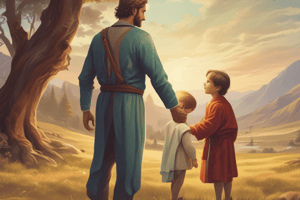Podcast
Questions and Answers
What effect did the Great Depression have on the individual referenced in the content?
What effect did the Great Depression have on the individual referenced in the content?
- It forced him to depend on others for success.
- It allowed him to embrace a carefree lifestyle.
- It required him to work harder to secure food and employment. (correct)
- It provided him with an opportunity for self-discovery.
How does the writer characterize the father's sense of manhood?
How does the writer characterize the father's sense of manhood?
- It is portrayed as being solely about aggression and dominance.
- It is depicted as a combination of strength and vulnerability. (correct)
- It is described as dependent on societal validation.
- It is seen as transcending traditional gender roles.
What new vision of manhood does the content suggest for the future generation?
What new vision of manhood does the content suggest for the future generation?
- Emphasis on aggression and competition among men.
- Recognition of emotional intelligence and vulnerability. (correct)
- Reinforcement of traditional male roles in society.
- A reliance on societal rituals for transitioning to manhood.
What loss does the individual experience that affects his sense of manhood?
What loss does the individual experience that affects his sense of manhood?
What does the writer imply about the father's perception of manhood in comparison to modern views?
What does the writer imply about the father's perception of manhood in comparison to modern views?
What primarily led the father to lose his sense of self-worth?
What primarily led the father to lose his sense of self-worth?
How does the text distinguish between being a male and being a man?
How does the text distinguish between being a male and being a man?
What does the father's failure to see his manhood as separate from his maleness signify?
What does the father's failure to see his manhood as separate from his maleness signify?
What tragic aspect of the father's life is highlighted by his decline?
What tragic aspect of the father's life is highlighted by his decline?
What fundamental qualities are associated with being a male in the text?
What fundamental qualities are associated with being a male in the text?
Flashcards are hidden until you start studying
Study Notes
Reflections on Manhood
- Author's father is depicted as an ordinary man with a strong moral character, embodying kindness and a lack of intentional harm towards others.
- Over the years, the father experiences a profound decline in self-worth, losing interest in life due to various losses: his job, strength, and sense of usefulness.
- Despite his family's love and respect, the father's self-honor diminishes as he struggles with feelings of betrayal by himself and his body.
- Key questions arise about the father's contemplation of manhood, strength, and success, prompting a reflection on what it means to be a man versus merely being a male.
Male vs. Manhood
- Being a male is biologically determined, associated with traits like strength, dominance, and competition necessary for survival in earlier human histories.
- Being a man involves channeling these male traits into actions that benefit others and serve a meaningful purpose.
- Historically, societal constructs did not differentiate between maleness and manhood, leading to a conflated identity tied to dominance and aggression.
Historical Context and Personal Struggles
- The father's upbringing signifies immense challenges: poverty, early orphanhood, and the struggles of the Great Depression that fostered a survival mindset built on competition.
- Participation in wars after the Great Depression further entrenches a sense of manhood tied to mastery and aggression, which later diminishes with physical decline and job loss.
- Experiences of dependence and purposelessness arise from these losses, indicating a critical transformation in self-perception from dominance to vulnerability.
Recognition of True Manhood
- The author recognizes the father's true manhood, exemplified through selfless acts of service and dedication to family, contrasting the father's self-assessment.
- The narrative reflects how the father's contributions and sacrifices are overshadowed by societal definitions of manhood that emphasize physical prowess and dominance.
Changing Perspectives on Manhood
- New definitions of manhood are necessitated by a changing world, rejecting traditional aggression and competition in favor of collaborative strength.
- The text highlights a generational shift in understanding masculinity, with a call for men to forge their paths to manhood amidst a lack of traditional rituals or guidance.
- The concluding message emphasizes self-discovery and individualized expressions of strength, courage, and mastery as markers of authentic manhood in contemporary society.
Studying That Suits You
Use AI to generate personalized quizzes and flashcards to suit your learning preferences.



